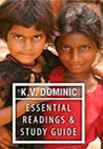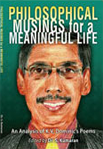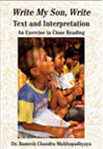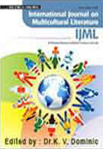Details of Critical study
Spirituality vs Materialism in The Guide
Year Of Publish:
The Conflict between Spirituality and Materialism in
R. K. Narayan’s The Vendor of Sweets
As part of East-West conflict, one can notice the conflict between spirituality and materialism in all the novels of R. K. Narayan. Due to the colonial rule and western education, modern materialism got into Indian minds. Spirituality, the hall mark of the Indians started to ebb from people’s way of life. Thus there appeared open conflict between the elder, uneducated Indians and the younger, educated ones. Conflict is also visible within the minds of the younger generations—between their inherited spiritual self and the acquired material self. The characters of Narayan’s novels can be divided into two categories: spiritualists and materialists.
R. K. Narayan’s The Vendor of Sweets was first published in London in 1967 by The Bodley Head Ltd. Its seventeenth reprint appeared in 2006. East-West conflict is the major theme of the novel. It is the conflict between a genuine Indian or Eastern father and his Western-bred son. Jagan, a college-educated man in the late fifties has made a success of his sweet shop. Though he grew quite rich as a sweet-vendor, his main interest and concern was his only son, Mali. Mali’s mother died of brain tumor several years back. The barrier between the father and the son came into being the day the mother died. It might be that Mali, a little bewildered and dismayed, felt obscurely that in some way his father was responsible for his mother’s death. Jagan was an advocate of nature cure. Jagan’s love both for his wife and his son was deep and unwavering. The tragedy is that when he lost his wife, he lost also any affection that his son might have had for him. Jagan’s love for the son was so much that he hastened home from his shop in the evenings thinking that the boy would be lonely. But Mali did not rise to his expectations and he preferred to be alone and detached. It led to a total estrangement between the two. Even after having lived twenty years with his son Jagan knew very little about him. Jagan was very proud of his son but he had no control over him. Mali gave up his studies and went to America. Mali’s letters from America only added Jagan’s worries. Jagan could not think of his son eating beef. He was a true Gandhian and a vegetarian. During India’s freedom struggle he had been arrested for hoisting Indian flag. He lived a very simple life. He ate food cooked by his own hands. He never used sugar or salt since he believed that they were detrimental to health. As recommended by Gandhi he spun on his charka and used clothes made of khaddar. Jagan could not use tooth brush as he feared that its bristles were made of pig’s tails. The Bhagawad Gita was always in his hand and he read it whenever he was free. Thus Jagan was a model of traditional Indian values whereas his son was the other extreme, a spokesman of modern Western values. Spirituality in him gave way to materialism. After three years of education in America, Mali returned home accompanied by a Korean-American girl name Grace. When Mali announced to Jagan that the girl was his wife, Jagan was shocked. Still he loved them, gave due respect and allowed them to stay in his house. He accepted Grace as his daughter-in-law. She also behaved admirable towards him. But soon cracks developed not only between Jagan and Mali but also between Mali and Grace. Jagan was unwilling to finance a huge amount of money for Mali’s establishment of story-writing machine. It was too much for Jagan when Grace announced to him that Mali and Grace had been living together without being married; nor was Mali willing to marry her. The ever-growing tension in father-son relationship reached its climax when Mali was caught red-handed for breaking the prohibition laws. Then there came in Jagan’s life the moment of self-realisation and also of decision. He managed to break away from Mali and his scheming and vicious world which he could not approve. He escaped from the chains of paternal love. Jagan abandoned the world and retired into a life of spiritual devotion. He was altogether unaffected to hear that Mali was in jail as the police had caught him with liquor in his car. He thought that a period of jail might be good for the young man.
Jagan is the most vibrant character of the novel from the first page to the last. Mali, his son who returned from America with a half-American half-Korean girl whom he reported as his wife and later said he never married, had been something of a sensation disturbing the placid waters of Malgudi. But Mali is insignificant when compared to his father. To quote P. S. Sundaram:
Twelve of the thirteen chapters of the book deal with Jagan, a widower nearing sixty. He is not likely to celebrate his shashtabyapurti as no one seems to care. The last but one of the thirteen chapters in a flash-back deals with Jagan’s boyhood, youth and marriage, his begetting Mali after years of waiting and prayer; and this, with other references in the course of the book to Jagan’s relationship with his elder brother and the tragic way he lost his wife, completes the picture telling us all we need to know of him. (91)
Instances of the conflict between spirituality and materialism are many in The Vendor of Sweets. Given below are some of the occasions and conversations in the novel which speak in ample about such conflicts:
“Conquer taste, and you will have conquered the self,” said Jagan to his listener, who asked, “Why conquer the self?” Jagan said, “I don not know, but all sages advise us so” (Narayan 7). This opening paragraph of the novel proclaims what follows in the novel. It is clear from Jagan’s words that he represents the Indian spirituality. Though he is a follower of it he is unaware of the philosophy behind the spirituality. He follows what the sages have advised him to do. The reasoning and philosophical aspect of spirituality is exercised or is supposed to be exercised by the sages. The sages are meant for it. The lay man need not bother about it. He just obeys what the sages advise. This is the case of Indian spirituality unlike the western. Compared to several million spiritualists in India, we find only thousands in the West. The majority of the people in the West are materialists. They are not willing to surrender their brain to unquestioning and blind faith. This line of thinking is reflected in the listener’s question. The westerner’s do not understand the need for conquering the self. What he loves most is his self and for its sustenance and comfort he devotes his life. This philosophy is revealed from the listener’s question, though he is an Indian. An Indian putting forward such a question implies that the modern Indians have started to imitate the materialistic thinking and way of life of the westerners.
Jagan is a Gandhian and a spiritualist. His way of life—dress, foot-wear, food etc. are narrated in detail in the first chapter. He wore a loose jibba over his dhoti, both made of material spun with his own hand; every day he spun for an hour. He never possessed more than two sets of clothes at a time. He delivered all the excess yarns in bundles to the local hand-loom committee in exchange for cash. Although the cash he thus earned was less than five rupees a month, he felt a sentimental thrill in receiving it, as he had begun the habit when Gandhi visited the town over twenty years ago, and he had been commended for it. . . . He draped his shoulders in khaddar shawl with gaudy yellow patterns on it and shod his feet with thick sandals made out of the leather of an animal which had died of old age. Being a follower of Gandhi, he explained, “I do not like to think that a living creature should have its throat cut for the comfort of my feet,” and this occasionally involved him in excursions to remote villages where a cow or calf was reported to be dying (Narayan 9). The Gandhian principles of self-reliance, ahimsa, as well as the dignity of labour are established in Jagan’s way of life.
Though an avowed Gandhian, Jagan’s actions and words sometimes question his Gandhism. To cite an example from the novel, Jagan orders one of his employees, “Captian, that beggar should not be seen here except on Fridays. This is not a charity home” (Narayan 12). Though hypocritical, this attitude of Jagan is excusable when one takes him as only a lay man and not an ascetic.
Jagan is ambivalent when it comes to his philosophy and attitude. He is a materialist and at the same time spiritualist. Profit-making is his sole motto as a vendor. But he is not prepared to make profit at any cost. He does not want to adulterate his sweets. He wants to provide quality products at reasonable rates. The Gita is always in hand and he reads from it in the leisure time. One may doubt whether the Gita is a cover to cheat people and amass money. He never concentrates on what he reads; his ears and mind are in the kitchen, whether the employees are sitting idle or not. He has no prick of conscience to sell rotten jilebi re-cooked to new shape and item. To quote from the novel:
Jagan asked, “What do we do with the leftovers?”
The head cook said soothingly as usual, “We will try a new sweet tomorrow, if you let me to do it. . . . We can always pulp everything back and fry them afresh in a new shape.”
Jagan said philosophically, “After all, everything consists of flour, sugar and flavours . . .” (Narayan 13)
Jagan’s hypocrisy is revealed in this response. There is a conflict of materialism and spirituality in his mind. Merchants as a category are concerned with sale of their goods and thus make maximum profit. Jagan, though a Gandhian, can not be an exception to it.
Jagan felt proud of his son Mali since he had told him that he was going to write a novel. Jagan also had a plan to write a book on diet. Jagan shared this news of the son to his cousin and added:
“I hope he will also emulate my philosophy of living simple living and high thinking, as Gandhi has taught us.”
“True, true. But what I don’t understand is why you should run a trade, make money, and accumulate it.”
“I do not accumulate, it just grows naturally,” said Jagan. (Narayan 39)
Jagan’s hypocrisy and bent to materialism is expressed in his words.
Though Jagan was a Gandhian in his observances, his mind lacked that spirituality as one finds in the beginning of the story. He was materialistic and profit motivated. But since Mali and Grace started to exploit him for their whims, a sudden transformation took place in Jagan. He wanted to reduce the price of the sweetmeats. He told his cousin:
“From tomorrow the price of everything will be reduced. I have made up my mind about it.”
“Why?” asked the cousin in consternation.
Jagan spurned an explanation. He just said, “We buy provisions for, let us say, a hundred rupees a day, and the salaries of our staff and the rent amount to, let us say, a hundred . . . and the stuff produced need not earn more than, let us say, two hundred in all. Now, the truth is . . . more people will benefit by a reduction.” (Narayan 91)
Jagan’s transformation from a materialist to spiritualist is evident in these words. He has become a true Gandhian now.
When the cousin told Jagan that he (Jagan) was opposed to eating sugar, Jagan replied, ““I see no connection. It others want to eat sweets, they must have the purest ones, that is all. I am thinking particularly of children and poor people”” (Narayan 91). The spiritual and Gandhian element of Jagan is evident in these words. He did not want to cheat people and amass money as majority of vendors did.
On another occasion Jagan told the cousin, “Money is an evil . . . We should all be happier without it. It is enough if an activity goes on self-supported; no need to earn money, no need to earn money”” (Narayan 92). These words proclaim that Jagan has grown into a real ascetic.
When the bearded man Chinna Dorai insisted Jagan to come down to the water in the pond, Jagan doubted that he was going to be drowned by him. Jagan was not shaky but thought that it was better to die than live. He told himself, “If I do not perish in this water, I shall perish of pneumonia. In my next life, I’d like to be born . . .” his mind ran through various choices. Pet dog? Predatory cat? Street-corner donkey? Maharajah on an elephant? Anything but a money-making sweet-maker with a spoilt son” (Narayan 116). It is evident from his thoughts that he has matured into a spiritual man, purged of his material, money-making urges.
Chinna Dorai told Jagan that he was sixty-nine, and would die the next year. He wanted to finish the idol of the goddess before his death on the stone which his master had put in the pond for seasoning. Thoughts about the future of the garden and image of the goddess after his death troubled him. Hence he asked Jagan to buy that garden and install the goddess. To quote his words: ““I only though it would do you good to have a retreat like this.”
“Yes, yes, God knows I need a retreat. You know, my friend, at some stage in one’s life one must uproot oneself from the accustomed surroundings and disappear so that others may continue in peace”” (Narayan 120). Jagan’s transformation from grihasta to vanaprasta is revealed through these words.
The novel depicts the opposition between two value systems—spiritualistic and materialistic—operating in the post-colonial Indian society. But the conflict is of a knotty and intricate character. “Both Jagan and Mali experience the opposition between traditional Indian values and the modern Western values. Mali, with all his national, progressive modern attitudes ends up in prison and Jagan for all his faith in the traditional Indian culture becomes a modern sanyasi” (Nanda 91). Jagan could not retreat to the forest and lead a lonely life there for ever. His retreat had to be bought with the money from the sweet shop. As the novel ends, Mali who has been imprisoned and thus tempered of his aggressiveness waits to be bailed out by his father.
Narayan might have been ironical in the treatment of Jagan’s character, but his irony has been tempered with sympathy. He is never critical of the Indian tradition. In the words of Nanda:
In Jagan’s retreat, Narayan has given us the sense of the timelessness of his struggle and of the larger social, cultural and religious fabric in which he plays his part. Jagan has turned sixty. At this ripe age, the worldly entanglements appear futile to him, his daily routine monotonous and empty. At this age one has to turn the work of the world to others. Like a true Indian, Jagan decides to retreat to some place of purity. (92)
Though Jagan retreats, he does not forget his duties to Grace. He tells his cousin, “If you meet her, tell her that if she ever wants to go back to her country, I will buy her a ticket. It’s a duty we owe her. She was a good girl” (Narayan 185).
With regard to Jagan’s Gandhism one may doubt whether it is hypocritical, “Pecksniffian”, or a mere “smoke-screen” for his dishonesty. Though the contradictions are very true and apparent, to be fair to him, one has to note that he keeps up well past his middle age certain Gandhian practices acquired as a young man. To quote Jayantha:
In his own way he is an upright businessman and would not brook, under any circumstances, adulteration of the quality of sweets he makes and sells. And he takes considerable trouble to guarantee their quality even when he slashes down their period. To make money, as he successfully does, in the world of Malgudi he does not require any “smoke-screen” at all, at least of all Gandhism. Therefore “Pecksniffian” can not be the word to describe Jagan’s “Gandhism.” (64-65)
Jagan finally decided to retreat to Chinna Dorai’s grove and spend his future life in meditation and prayers before the image of Gayatri. He took with him his Gandhian charka and the “bank book.” One may suspect Jagan’s genuine intention of renunciation and vanaprasthasrama. But a closer look at what happens at the close of the novel would present Jagan’s action in the right perspective. He asks the cousin to run his shop and look after the cooks well until Mali takes it over from him eventually. Even the money in the bank is intended for his son once he comes out transformed from the prison. His readiness to buy Grace a ticket to enable her to return to her country is an indication of his attitude to people and money. To quote Jayantha again:
It is amply made clear in the novel that though Jagan, at the time of his departure to the grove, has neither conquered his attachment nor achieved the necessary equanimity of mind for a recluse, he has made a beginning in that direction . . . There is no indication either of Jagan’s return to his former way of life. It is a part of Narayan’s artistic strategy that he does not surround his protagonist’s withdrawal with an aura of solemnity and other worldliness. It is his distinction as a novelist that through the comic mode he is able to affirm the continued relevance of certain traditional Indian values of life. (72)
One of the modern influences that provided continuity between the past and the present culture of India was the personality of Gandhi. Himself an enigmatic man, Gandhi was a great force that provided the whole generation of Indians in the period before Independence a new sense of dignity, purpose and character. His strong sense of patriotism, ethical values, and asceticism deeply influenced the masses. “Narayan acknowledges the influence of Gandhi’s personality on the ordinary people in Waiting for the Mahatma and The Vendor of Sweets, for his heroes are not outstanding in any way bet reflect the mood of that period” (Gupta 23).
When Jagan is freed from the attachment and pursuit of money, the aesthetic, religious and moral tendencies surge forward for a new recognition and new inter relationship. When he is taken to the garden and the lotus pond by Chinna Dorai, Jagan receives a new set of impression, through which he perceives the close relationship between the various Indian arts, literature and Hindu mythology (Gupta 27). At this stage in Jagan’s life the Gandhian ideals of truthfulness and detachment merge with the ancient Hindu ideals of Purushartha and Ashramadharma, enabling Jagan to form a more coherent and meaningful relationship with them. “He gives up the illusion of being “a soul disembodied, floating above the grime of the earth” and becomes “free,” “determines,” perceiving with “extra-ordinary clarity, what his goals in life are.” His experiment with truth brings him a new critical perception and he faces himself with a courage. His retirement is purposive and creative for it is related to his quest for truth (Gupta 29).
Jagan does not lose hope of his son. He is optimistic that Mali will come back to lead a noble and responsible life. He believes that jail will purify him of all the blemishes. To quote Bruce F. Macdonald:
Even Mali, who constantly rejects his Indian past and tries to imitate a spurious Americanism, who lives unmarried with the casteless Grace, and advocates the killing of cows, and who is in jail when the novel closes, seems capable of being reclaimed into the historic process he has spurned. Jail may do him good, as his father anticipates, and the indication seems to be that he will, like his father, be imperfect yet acceptable. (155)
Narayan accepts the Hindu world view and believes in Maya. Through Jagan he proclaims that there is “that non-aligned human centre which refuses to be committed to anything in the world of illusion, because absolute commitment or orthodoxy in human society makes sincerity in the spiritual realms false, as being too strongly identified with maya” (Macdonald 156). Karma is not escaped in Jagan’s renunciation. “. . . in modern India Narayan feels the ideal of the sanyasi, like many other historic ideals, is impossible to attain fully, although the motivation may be the same as in earlier ages” (Macdonald 157).
The Vendor of Sweets is not merely a Hindu fable intended to illustrate man’s passage from one ashrama to another but a novel set in modern India where individuals strive to make sense of a complex and fast changing life and are continually caught in clash of ideas and values. “Narayan’s main discovery is the fact that traditional concepts like the ashramas and purusharthas in various disguises, distortions and subterfuges survive and continue to influence the lives of the people” (Amur 130).
Works Cited
Amur, G. S. “R. K. Narayan in His Own Culture: An Approach to The Vendor of Sweets.” Explorations in Modern Indo-English Fiction. Ed. R. K. Dhawan. New Delhi: Bahri Publications Pvt. Ltd., 1982. 123-130.
Gupta, Santhosh. “Jagan’s Experiment with Truth in The Vendor of Sweets.” The Journal of Indian Writing in English. 16.1. (Jan 1988): 22-30.
Jayantha, R. A. “Gandhi, “The Gita” and Gayatri in The Vendor of Sweets.” Triveni. 54.1 (Apr-Jun 1985): 61-72.
Macdonald, Bruce F. “Humanity and Aesthetic Order in The Vendor of Sweets.” Perspectives on R. K. Narayan. Ed. Atma Ram. Ghaziabad: Vimal Prakashan, 1981. 151-159.
Nanda, Bijaya Kumar. “The Novels as a Social Construct: A Study of R. K. Narayan’s The Vendor of Sweets.” Haritham.12. (2000): 88-94.
Narayan, R. K. The Vendor of Sweets. Chennai: Indian Thought Publications, 2006.
Sundaram, P. S. “The Vendor of Sweets.” R. K. Narayan as a Novelist. By
P. S. Sundaram. Delhi: B. R. Publishing Corporation, 1988. 91-96.
K. V. DOMINIC is a faculty member of the PG Department of English, Newman College, Thodupuzha East P. O., Kerala, India, Pin: 685585. He has been teaching UG and PG students for the last twenty three years. His research topics are “Pathos in the Short Stories of Rabindranath Tagore” and “East-West Conflicts in the Novels of R. K. Narayan with Special Reference to The Vendor of Sweets, Waiting for the Mahatma, The Painter of Signs and The Guide.” He is the author of the books Postcolonial Readings in Indo-Anglian Literature, Selected Short Stories in Contemporary Indo-Anglian Literature and Pathos in the Short Stories of Rabindranath Tagore. He has written a number of poems, critical essays and short stories in reputed journals and books. As the Editor of Indian Journal of Postcolonial Literatures (IJPCL), a reputed biannual published by the Centre for English Studies, Newman College, Thodupuzha, Kerala, he is a well known figure in the universities, colleges and such academic circles all over India. He is an Advisor of the Journal Parnassus: An Innovative Journal of Literary Criticism (Rae Bareli, India) and the Associate Editor of The Journal of Contemporary Literature (Allahabad, India). He can be contacted at:
Mob. Phone: 994794915
Land Phone: 04862 225758





